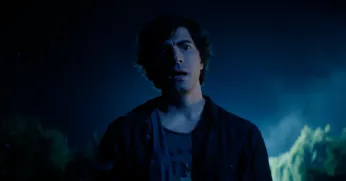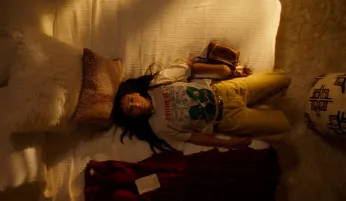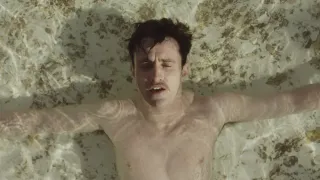
Jul 24
EDGE Interview: 'Ick' Director Joseph Kahn Gets Embraced By The Queer Community
C.J. Prince READ TIME: 2 MIN.
If you don’t know Joseph Kahn by name, you know his work. Since the 1990s, Kahn has directed over a hundred music videos for artists including Elton John, Backstreet Boys, Destiny’s Child, Christina Aguilera, and much more. He directed two of Britney Spears’ most famous music videos (“Toxic” and “Stronger”) and has collaborated with Taylor Swift multiple times (“Blank Space” and “Bad Blood” along with several others). When it comes to the zeitgeist of Western pop culture for the last thirty years, Kahn’s fingerprints are all over it.
People might be less familiar with Kahn’s work as a filmmaker, which started in 2004 with the critically derided action film “Torque” and has continued with three more features since. While “Torque” was made by Hollywood, all of Kahn’s features since then have been made independently, a decision he says isn’t by choice (“If I could have a studio pay for my crazy ideas…I would take that money in two seconds,” he says). Watching his independent films, like the slasher/comedy/sci-fi “Detention” and his rap battle movie “Bodied,” it’s easy to see how big studios could misunderstand his work. Kahn’s films, like his music videos, operate in a maximalist mode, with so many ideas, pop culture references, and directorial flairs flying around it’s bound to give some viewers whiplash. He’s a filmmaker in a constant sprint to keep up with the culture, and he won’t wait for others to catch up to him.
“Ick” is Kahn’s latest film, a horror/comedy about Hank (Brandon Routh), an elder millennial who teaches at the same small town high school where he peaked. Single, miserable, and still longing for his high school sweetheart Staci (Mena Suvari) who’s long since moved on, Hank’s sad life takes a turn when a strange alien substance called the Ick overtakes the town and starts to consume everyone. But much to Hank’s surprise, no one else is particularly concerned with the Ick; they prefer to ignore it and carry on with their lives, treating the horrific creature as nothing more than an inconvenience. More than just a gross creature feature, “Ick” is Kahn viciously satirizing everyone, from overly sensitive teens to out of touch millennials, all while poking fun at society’s apathetic attitude in the face of existential threats. It’s sharp, funny and, like all of Kahn’s work, extremely entertaining.
With “Ick” about to have a limited theatrical run through Fathom Events, EDGE sat down with Kahn to discuss his latest film, his legacy as a music video director, and what it means for him to get so much love from the gay community.

Source: Fathom Entertainment
You've worked with a slew of gay icons and you've been responsible for so much iconic imagery. And a lot of your work is still relevant. Even today, it's constantly referenced. How do you feel whenever you see your work get brought up, not just in general but also from groups like the gay community?
Joseph Kahn: I get such a kick out of it because the amount of love I get from the gay community is pretty phenomenal. I feel like I'm in a very lucky space because, when you get gay love, it's a special kind of love. They're cool, they're smart, they're intelligent, they're highly discriminating. And there's different factions of it, too. Having done this for 30 years, it's not a monolith.
I will say that part of my career that's made me different than, say, all the other nerds that go into this particular business is that I've been so highly involved in the fashion aspect of it. When I first started, I was just a straight up “Star Wars” dude. And then I got hired by Herb Ritts' company, who’s a great fashion director from back in the day. I remember being there on weekends editing videos and I would do nothing but look at all these fashion books. I learned that language and culture, and it made me different from the other guys because it made my work more beautiful. It gave me a sensitivity to that stuff, which has always been part of my arsenal, that I feel like mainstream culture kind of rejects. It's weird. As much of a “Star Wars” guy that I am, the gay community embraces me, and then sometimes a lot of the traditional nerd culture rejects me. It’s a really funny place to be.
With “Ick” and “Detention” you portray pop culture with no dividing lines in your references. It's like a continuum, you’re pulling from anywhere and everywhere to mash these references up. I wanted to know if that's reflective of your own perspective on pop culture as a whole.
Joseph Kahn: It is my perspective on pop culture. I'm about to get super pretentious because, when you do enough of these conversations over the course of the last two weeks, you start to develop these theses that you didn't even know existed. And a more recent thesis I've discovered is one of the reasons why my stuff is so heightened. I'm an immigrant to America. I was not born here. We went [from] Korea and I spoke Italian first, and then I had to learn how to speak English. And I started speaking English at the same time I learned filmmaking, so I learned the vernacular of movie making at the same time I learned filmmaking. But because the world I lived in was this sort of fantasy world, and I learned to incorporate myself into culture through fantasy, I realized that my perspective is different.
I'm not a gay kid, but when gay kids suddenly look at the construct of what society is, like, “You must marry this person and have this baby,” I was thrust into that from a different point of view. There are certain shocks to the system. The first thing was that I was this little Asian kid running around in the ‘80s not quite blending in with that particular society. And then on top of it, I go into rap videos. I had no idea what rap culture or black culture was. I thought everything they were talking about, like drugs and guns and sex, were just things that happened in the movies. So I'm doing all this stuff simply out of ignorance, and I'm not afraid of anything because I just don't know. And then I realized, by the time I made a movie like “Torque,” which is so heightened and over the top, it's not necessarily because I'm trying to do spectacle. It's because I literally think that way. To me, the rules of society are malleable. You set your own reality. So don't tell me what reality is. Don't tell me there are limitations to anything. I live in a world where, from my perspective, anything goes.
On the satirical element of “Ick” I wondered if, when you were working on this, did you think people would be willing to laugh at themselves given they’re the target of your satire? I know people who won't even engage with any media that acknowledges the existence of COVID, and that plays right into what your film is talking about.
Joseph Kahn: It's interesting, because the question of who it's targeting depends on the viewer. I don't think I make extremely political things, per se. It's not my number one concern because politics annoy me. I know they're necessary, and I think there are people out there to do that, but I am not the most political person. I have my political beliefs, but it doesn't dominate my art because I don't think that I'm the smartest guy in the room when it comes to this stuff. My agenda is to satirize because I know I can make jokes more than I can give answers. I don't know what you can and can’t say, but what I can do is give you a simulation of what the extremes are, and [let] you make that decision. But I hope you have fun watching and experiencing it.
With “Ick,” I'm satirizing things. We’ve had great responses [to the film], but we had some terrible responses. And if you really watch the terrible responses, it's political. They're saying I’m making fun of woke culture or I'm making fun of conservative culture. I'm stepping on everyone's toes. When I made this movie, it wasn't [thinking] I was going after woke kids. It's told from the perspective of a millennial who's aging out. It's a fish out of water story. It's a simulation of the millennial experience of suddenly feeling like you are aged out of culture right now. I make fun of that particular aspect, but at the same time there are Gen Z heroes [in the movie]. When it comes to Gen Z, this is a generation that thinks Asian dudes are hot. That has never happened before in the history of Western culture. So guess what? They are my favorite generation of all time now. [Laughs] It's not meant to roast one particular group. It's meant to roast everybody. Some people can take that, some people can't, and I can't control that.

Source: Fathom Entertainment
You have Brandon Routh and Mena Suvari in your film, and their careers have an obvious association with the 2000s. When you were casting your film, were you specifically looking for actors who would have this kind of strong affiliation with that time period?
Joseph Kahn: Obviously, when you make a movie like this, you want to cast some name brand actors. That's just the marketplace, but you also want to cast the perfect actor. Brandon had all this baggage of being Superman, which is the most coveted role in pop culture like Batman, Spider-Man, whatever. He had it, but then he didn't get to stay on that Superman level. I think he's an incredible actor. He has incredible range, he's charming, he's good looking. He should be Tom Cruise, and for whatever reason he is not Tom Cruise right now. So I thought [this role] was a perfect application of his baggage plus his talents.
For the girl that he's pining after for 20 years. I wanted a girl that feels justifiable to pine after for 20 years. And there is a girl that you pined after in the 2000s. They made a movie about her called “American Beauty,” and she's on the poster. It's Mena Suvari. So I thought, I gotta find someone like Mena Suvari because I'm not gonna get Mena Suvari. But I ended up getting Mena Suvari! It's like a wonderful gift from the movie Gods. It was a wonderful piece of serendipity that I got both of them.
I wanted to ask you about your editing process. It’s very rhythmic and punchy, and throughout your films you have such dense scenes and setups. How thorough is that process to ensure you're nailing down the exact tone and rhythm you want?
Joseph Kahn: I do preconceive the movie for sure. I storyboard the entire thing before I go into it, but as I shoot the movie I adjust to the actors. I think, ultimately, my editing is in a constant state of flux. My style keeps changing from year to year because technology changes, and people change. One of the most awesome things that happened to me is that I had kids, and I got to see youth again from their perspective. I have a 13-year-old and a six-year-old, and I see how the six-year-old starts watching YouTube, how she absorbs information, and the type of cartoons she watches. I can't get her to watch “Looney Tunes” but she'll watch some weirdo, Russian language thing that doesn't make any sense. And my 13-year-old only watches TikTok. She will not even watch anything else. It's 10 to 15 second bursts of information.
So I made a conscious decision that, when I made “Ick,” I was going to make a movie for young people. I wanted to make a PG-13 starter horror for kids, to essentially do the modern version of an Amblin movie and do it for today's generation. Now remember, back in the day when they did these Amblin movies, people would say these are flashy, hyper-focused, super fast-paced movies for that shallow MTV generation raised on television. They would complain about this all the time. And compared to a movie from the ‘50s and ‘60s, they were more accelerated. Chuck Russell’s “The Blob” is much faster than the original “The Blob” from [the 1950s]. Today, it's even more accelerated than that. So I had to decide: do I make a movie that really speaks to them and gives them the actual experience they deserve, or do I slow it down for everybody? Some of the audience will not be able to keep up with this, but it’s an independent movie. I can do what I want.
You have influences like ‘80s creature features and 2000s nostalgia, plus a satire of a contemporary subject. What made you want to mash these things together and see what results from it?
Joseph Kahn: It starts with the meaning of the story. Why tell the story in the first place? The initial idea was that I wanted to make a creature feature for today. They don't really make these monster movies today. It's very odd. That was a thing back in the ‘80s and definitely in the ‘50s. They would come up with movies like “Them!” and “The Blob.” Today, The Blob does not exist. You have to wonder why, so you have to look at the scope of horror right now. Horror is such a big genre because it’s all adult oriented. The reality is, this stuff was never geared towards kids. Now, essentially, the slasher has been commoditized into youth culture entertainment. And I was like, you know what? Let me make something that I feel like a 13 year old can truly watch from the beginning. So that was the initial conception of it.
But then I wanted to tell a story about aging, because it's in a small town and my lead character is a 45-year-old man who's a millennial. A 45-year-old man is a millennial now, which is a brand new thing. I used to make things for millennials when they were the new, annoying generation, when everyone complained about how shallow they are and how they have no attention span. Now they're saying all the same things about Gen Z, and he's turning into that person. So I put his music in there, and what was his music 20 years ago? It was pop punk. That stuff's not even played on the radio anymore. You will never drive up next to a car and hear it thumping Yellowcard. It just doesn't happen. I thought it was fun to explore that and make millennials feel old for the first time.
But at the end of the day, as old as you feel, there's a lesson here. What happens to a lot of people when they're older is they realize they're not achieving the things that they thought they were going to be when they're younger. When you're younger, you think you're going to grow up and become the next Tom Brady or the next Steven Spielberg or whatever. And by 45 those things don't happen, and you might feel depressed like he did. But at the same time, in the movie he discovers he might have a daughter, and through that he finds joy in life. I don't answer whether or not it's his actual daughter because I think that's unimportant. Whether or not it's genetic, that sort of unconditional love for someone else is the joy of life, and that's more important than whether you achieve your technical goals. So I want millennials to watch this movie, feel old, and then walk out of it feeling good. That's the goal.






